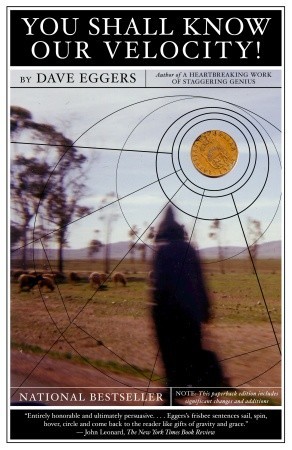David Eggers’s fiction debut “You Shall Know Our Velocity,” falls staggeringly short of the high mark set by his best-selling memoir, “A Heartbreaking Work of Staggering Genius.” In “Genius,” Eggers tells of his travails in raising his younger brother, and trying to lead a happy twenty-something life after the death of both of his parents. There is an inherent urgency and tragedy in this situation that “You Shall Know Our Velocity,” is entirely unable to contrive. Rather, Eggers gives the reader philosophical rambling, buddy-novel clichés, and middle class agony and ambivalence, all of which fail to resonate. In “You Shall Know Our Velocity,” Eggers’s resplendent descriptive powers and his ability to imbue the mundane with mythic importance occasionally shine, through his style is inconsistent and changes nearly as often as the protagonists change countries.
As in “Genius,” the protagonists of the novel, Hand and Will, have recently suffered a demoralizing loss: their best friend, Jack, has just died in a theatrically described car accident (in which his sedan is run over by a giant truck). Will has recently collected eighty thousand dollars from a light bulb company for the rights to his fortuitously selected silhouette. Desperate to find meaning and to unload the powerful eighty thousand dollar burden, Will and Hand begin planning a trip on which they will visit impoverished countries from Rwanda to Russia, and give away thirty eight thousand dollars. Despite his obvious talents, not even Eggers can successfully build a gripping plot around white males in their twenties giving away their oppressively abundant money.
After much bureaucratic difficulty, Will and Hand begin their journey in Dakar, Senegal, where they first get a taste of how difficult it is to give away money. Even if one is sympathetic to this plight, neither Hand, and his plethora of sometimes-true facts and conjectures, nor Will, with his constant philosophical commentary and self-pity, are particularly endearing. Trying to fit their entire multi-nation journey into Hand’s vacation week, time must be utilized efficiently, preferably not spent in African airports. For reasons of convenience, Hand and Will fly directly to Morocco. There are myriad references to time and motion, particularly in relation to physics. Eggers spends a few hundred words on the subject of teleportation. This scientific motif is not particularly coherent, yet it still manages to scream, “we’re moving as fast as we can to escape ourselves,” loud and clear.
The novel is peppered with various gimmicks and literary contrivances that at times feel gratuitous and less effective than Eggers’s descriptive power, but are occasionally riotous. For example, there is a digitally rendered image of the note Will and Hand write to accompany the cash they tape onto a donkey. It reads: “Here I am. Rock You Like a Hurricane,” in sloppy longhand.
As the pair hop from nation to nation they encounter various forms of destitution, spiritual (a morally bankrupt Frenchman in Senegal) and literal (Russian prostitutes in Latvia). The novel often feels as though it can be broken down into a formula: [new country]+[aphorism given by or derived from the impoverished]=[juvenile stunt or amateur philosophical discourse].
Despite the novel’s failings, there are still enough flashes of brilliance to show off Eggers’s prodigious talents. The book does not feel as soulful or as emotionally invested as “A Heartbreaking Work of Staggering Genius.” “You Shall Know Our Velocity” is in all probability the work of a writer who needed to write, rather than a work that needed to be written.

